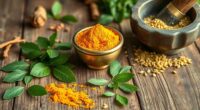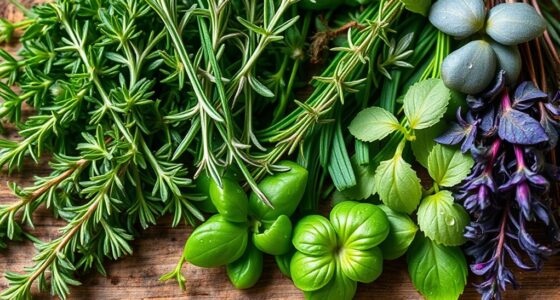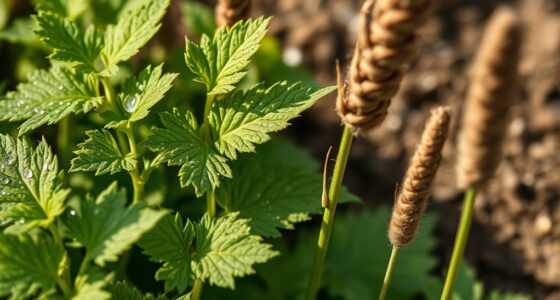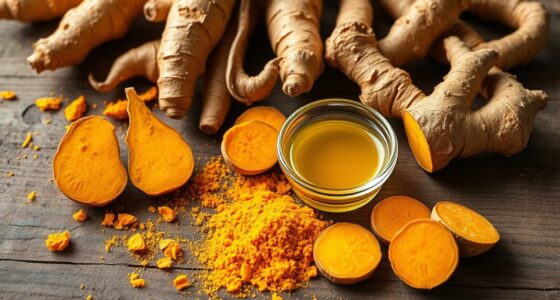In traditional Chinese medicine, herbs like Eucommia bark (Du Zhong) and Rehmannia root (Shu Di Huang) are key for strengthening bones by nourishing the kidneys and liver. These organs are believed to directly influence bone health, so herbal formulas target their balance to promote bone strength and prevent osteoporosis. Combining these herbs with a healthy lifestyle enhances their effects. Keep exploring to discover how these ancient secrets work together for better bone health.
Key Takeaways
- Traditional Chinese herbs like Du Zhong and Shu Di Huang have been used for centuries to strengthen bones and prevent osteoporosis.
- TCM links kidney and liver health directly to bone vitality, utilizing herbs that nourish these organs.
- Herbal formulas are tailored to individual needs, emphasizing holistic approaches and lifestyle factors for optimal bone support.
- Consulting qualified practitioners ensures safe, effective herb use and prevents adverse interactions or side effects.
- Combining high-quality herbs with proper nutrition, calcium, vitamin D, and exercise enhances overall bone health.
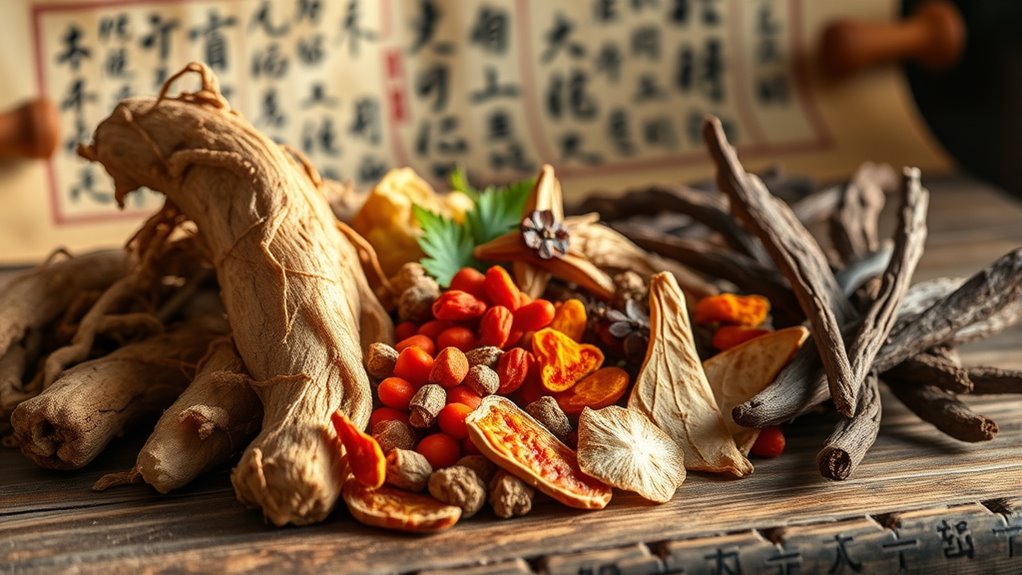
If you’re looking to strengthen your bones naturally, Chinese herbs offer a traditional and effective approach. These herbs have been used for centuries in Traditional Chinese Medicine (TCM) to promote bone health and prevent conditions like osteoporosis. Incorporating herbal remedies into your routine can support bone density and overall strength, but it’s essential to take into account both their benefits and safety. When exploring herbal supplement safety, it’s wise to consult with qualified practitioners to ensure you’re using the right herbs in appropriate doses. This helps minimize risks and guarantees you receive the maximum benefits for osteoporosis prevention.
Many Chinese herbs are celebrated for their ability to nourish the kidneys and liver, which, according to TCM, are closely linked to bone health. For example, herbs like Du Zhong (Eucommia bark) are known to tonify the kidneys, which is believed to strengthen bones and joints. Similarly, Shu Di Huang (prepared Rehmannia root) is often used to nourish blood and improve circulation, which can indirectly support bone regeneration. These herbs are often combined into formulas tailored to your specific needs, providing a thorough approach to osteoporosis prevention.
Using Chinese herbs for bone health isn’t just about taking a single supplement but adopting a holistic approach. Proper herbal formulation, combined with dietary adjustments and lifestyle changes, enhances effectiveness. Consistency is key—regular use over time can yield noticeable improvements in bone strength and reduce fracture risk. Additionally, understanding the herbal synergy of combined herbs can optimize their effects and safety. However, it’s vital to be mindful of herbal supplement safety. Some herbs may interact with medications or cause adverse effects if not used properly. Always seek guidance from trained TCM practitioners or healthcare providers who understand herbal medicine to avoid potential complications.
In addition, quality matters greatly when choosing herbal supplements. Opt for reputable sources that provide standardized extracts and transparent manufacturing processes. This ensures you’re getting safe, potent herbs free from contaminants. Understanding the properties of each herb and how they work together allows you to make informed decisions, maximizing benefits while minimizing risks. Remember, herbal remedies are most effective when integrated into a balanced lifestyle that includes adequate calcium, vitamin D, regular weight-bearing exercise, and avoiding smoking or excessive alcohol.
Frequently Asked Questions
Can These Herbs Prevent Osteoporosis in the Elderly?
You wonder if these herbs can prevent osteoporosis in the elderly. While herbal efficacy varies, traditional practices suggest some herbs may support bone health by providing essential nutrients and stimulating bone regeneration. However, scientific evidence is limited, so you should consult a healthcare professional before relying solely on herbs. Combining traditional remedies with modern treatments might offer the best approach to maintaining strong bones as you age.
Are There Any Side Effects From Long-Term Herbal Use?
You wonder if long-term herbal use causes side effects. While herbs can support health, herb toxicity and long-term safety are important concerns. Prolonged use without proper guidance might lead to adverse effects or interactions with medications. To stay safe, consult a healthcare professional, monitor your body’s response, and use herbs in moderation. Regular check-ups help ensure you’re not risking herb toxicity or compromising your long-term safety.
How Do Herbs Compare to Western Bone-Strengthening Medications?
You may wonder how herbs compare to western bone-strengthening meds. Herbs often have good herbal efficacy, but their effectiveness varies due to herbal standardization issues. Western medications tend to deliver more consistent results, backed by scientific testing. While herbs can support bone health naturally, they might lack the rapid, predictable outcomes of pharmaceuticals. Always consult a healthcare provider to balance herbal use with conventional treatments safely.
Can These Herbs Be Used Alongside Conventional Treatments?
Think of your body as a symphony, where every note must harmonize perfectly. You can often play herbal remedies alongside conventional treatments, but you need to be cautious about herbal interactions and herbal safety. It’s essential to consult your healthcare provider to confirm these natural notes don’t clash with your medications. With proper guidance, you can craft a balanced melody that strengthens your bones without risking disharmony.
What Are the Best Herbs for Bone Regeneration After Injury?
You should consider herbs like Dang Gui (Angelica sinensis) and Du Zhong (Eucommia ulmoides) for bone regeneration after injury. Focus on traditional preparations and herbal dosages recommended by TCM practitioners to guarantee safety and effectiveness. These herbs are believed to promote healing and strengthen bones. Always consult a healthcare professional before starting any herbal treatment, especially if you’re combining it with conventional medicine.
Conclusion
By embracing these ancient Chinese herbs, you harness the wisdom of centuries—like a sturdy tree rooted deep in nourishing earth. Imagine your bones, resilient as bamboo swaying in the wind, fortified by nature’s secrets. With consistent care, you become a vessel of strength, standing tall through life’s storms. Let these time-honored remedies be your guiding light, turning age-old traditions into your personal fortress of health and vigor.


